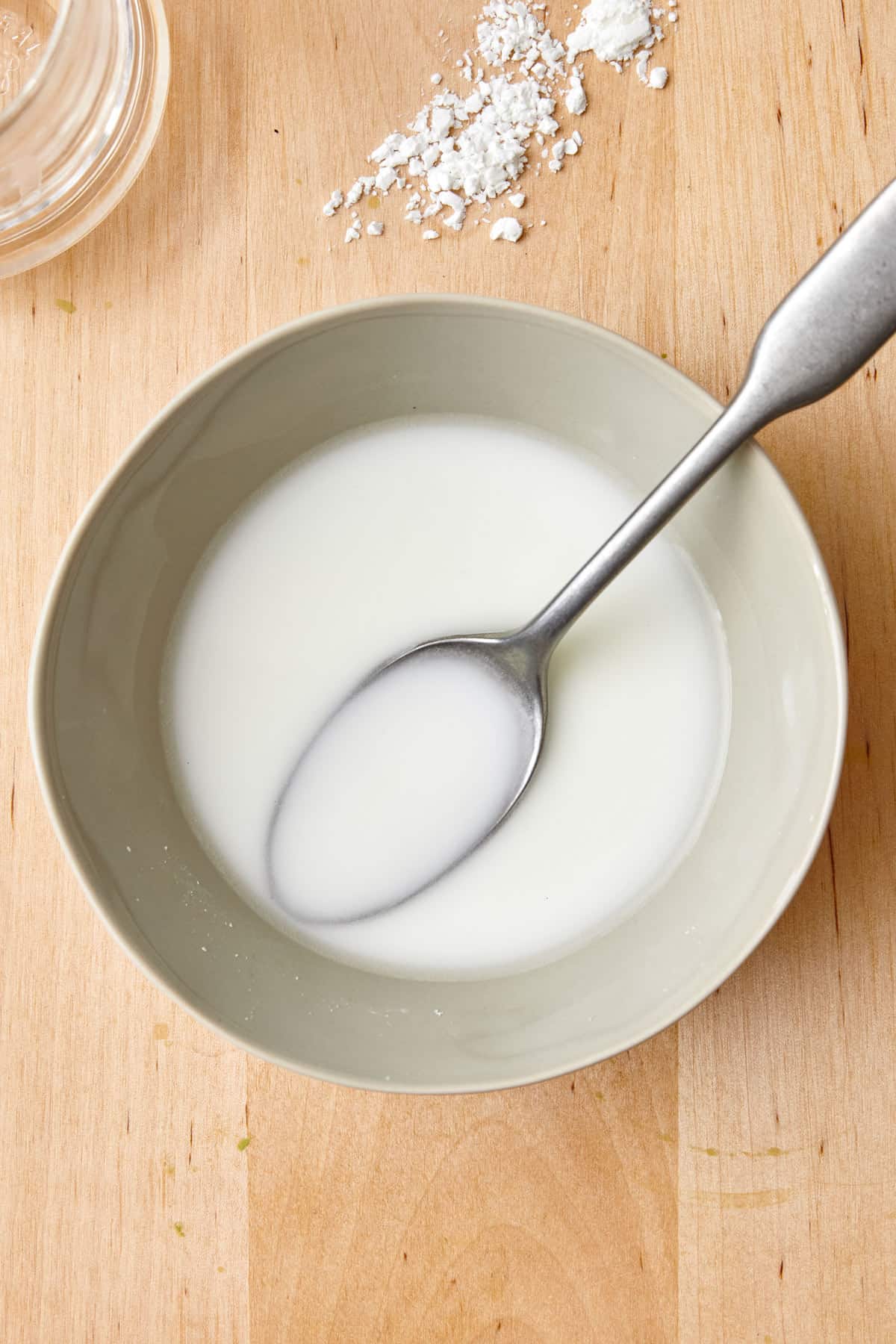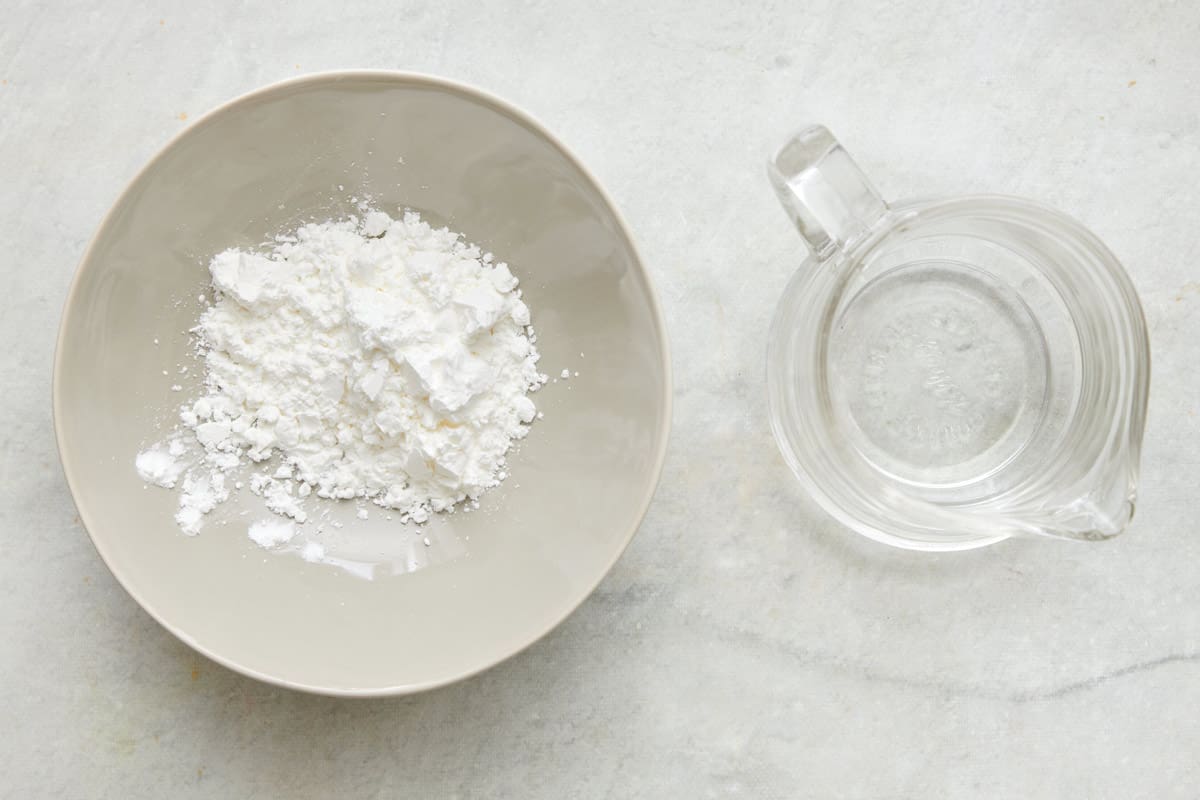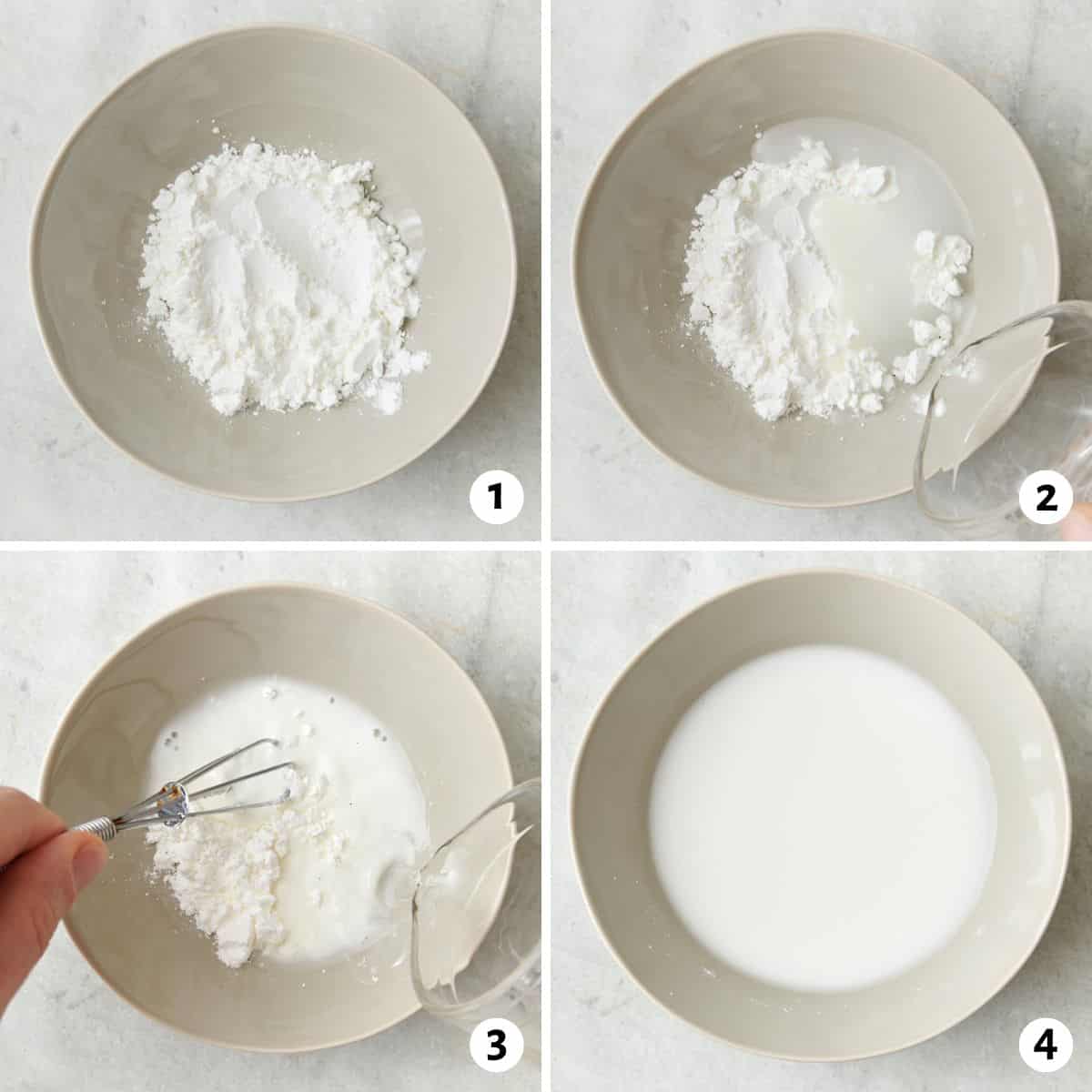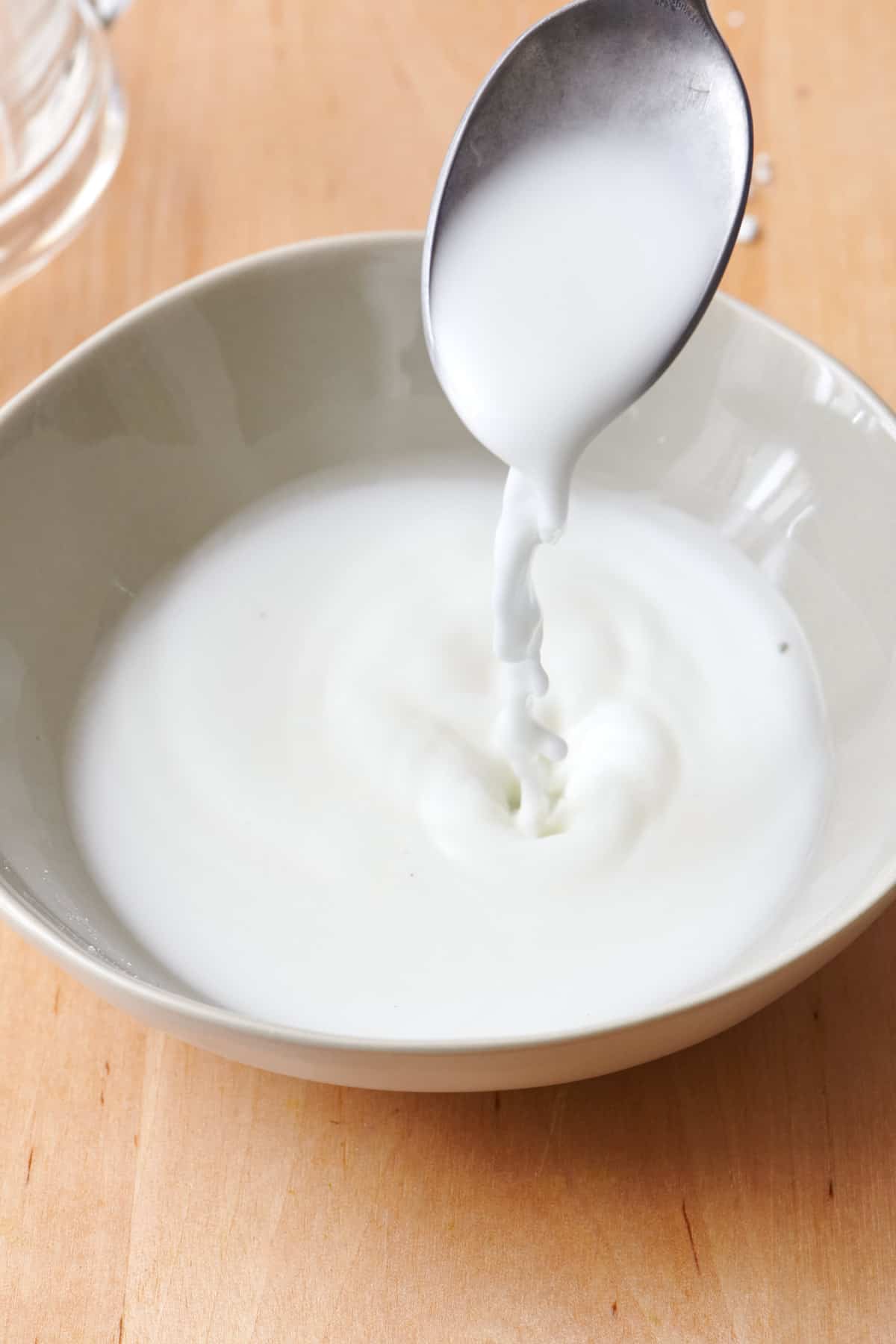How to Make Slurry
Published Sep 22, 2023
Learn how to make a cornstarch slurry, which works perfectly to thicken soups, stews, and gravies, all without needing to create a roux!
This post may contain affiliate links. Please read our disclosure policy.
Learn how to make a cornstarch slurry to help thicken soups, gravies, sauces, and more! This simple mixture of cornstarch and cold water works magic in dishes that we want to be a little thicker. It’s a simple yet powerful combination of basic ingredients that takes your dishes from good to great! And this quick guide on how to make slurry will give you all the confidence you need to take your dishes to the next level with this basic skill.

Jump to Section
If you ever wanted to know how to thicken beef stew, gravies, or soup to get that silky smooth texture – it’s cornstarch slurry.
What is a Cornstarch Slurry?
A slurry is a mixture of liquid and cornstarch or flour. It’s used as a thickening agent in foods and is commonly added towards the end of the cooking time. In short, it’s the opposite of a roux, a cooked fat and flour mixture added at the beginning of the recipe. A slurry is a quick and simple way to thicken various dishes, including soups, stews, and sauces.
It is created by mixing cornstarch with a cold liquid, usually water, until it forms a smooth, lump-free mixture. This mixture is then added to a hot liquid that you wish to thicken. The great thing about a cornstarch slurry is that it integrates seamlessly into your dishes, providing a nice thickness without altering the flavor. It’s a must-have trick in every home cook’s arsenal to ensure that your dishes have the perfect consistency every time.
Slurry Ratio of Cornstarch to Water
When preparing a cornstarch slurry, the standard ratio most cooks use is 1 part cornstarch to 2 parts cold liquid. To achieve the right consistency, always start with a 1:2 ratio and then adjust as necessary. The key is to mix it until smooth to avoid any lumps before adding it to your recipe.
How Much Slurry Do I Need?
Determining how much slurry you need can depend largely on the type of dish you’re preparing and your personal preference for its consistency.
- To Thicken Soups, Stews, Curries, and Stir-Fries: Start with 1 tablespoon of prepared slurry, which should be added to your dish while it’s at a boil, then allow it to cook for 1 minute. Test the consistency, and if you desire a thicker texture, continue adding the prepared slurry 1 tablespoon at a time until you achieve the preferred thickness. Remember, it’s always easier to add more slurry later than it is to thin the dish back down, so approach this incrementally.
- To Thicken Sauces, Gravies, and Fruit Fillings: Begin with a starting point of 1 tablespoon of prepared slurry for every 1 cup of liquid. Bring the mixture to a boil and let it cook for 1 minute. Assess the consistency, and if it is not to your liking, progressively add more slurry, a tablespoon at a time, testing after each addition.
WHY learn to How to Make Slurry
- Quick and easy recipe. This simple guide shows you how to make a slurry with only 2 basic ingredients that you probably already have on hand. And it’s much simpler than a roux because no heating is involved.
- Instantly thicken anything. Using a good slurry is how to thicken soup, sauces, stews, and more with very little effort. It’s versatile and tasteless, so it won’t alter the flavor of your dish.
- Rescue any recipe with this simple fix. Slurries are a quick and efficient way to rescue dishes that have not thickened as expected. A slurry can be added on the spot to save the dish, and because it’s added at the end of the recipe, you have time to decide whether or not to use it.
Ingredients to make Cornstarch slurry
- Cornstarch: This fine white powder is derived from corn kernels and is primarily used in cooking as a thickening agent. Cornstarch is the base of this slurry and gives your finished foods a clear and glossy finish. Cornstarch is not the same as corn flour.
- Water: Cold water added to cornstarch helps it dissolve and disperse evenly throughout the slurry. Be careful not to use warm or hot water to avoid prematurely thickening the slurry before it’s added to the recipe.

HOW TO MAKE a Slurry with Cornstarch
- Place the cornstarch in a small bowl.
- Gradually pour the cold water into the bowl.
- Whisk or stir with a fork constantly as you add the water.
- Continue whisking until the cornstarch is dissolved completely and the mixture is smooth with no lumps.

TIPS FOR Cornstarch Slurry
- Use proper cornstarch water ratio. A general rule of thumb is to use a 1:2 ratio of cornstarch to water, but that may depend on a particular recipe. If the dish isn’t thickening enough, you can prepare a little more slurry and add it to the mixture.
- Check for lumps. Whisk the slurry well to ensure there are no lumps. If you spot any, continue stirring until they are fully dissolved, or remove them so they don’t clump up your dish. If you find your slurry very lumpy, run it through a sieve to get a smooth consistency.
- Add slurry gradually. When adding the slurry to your recipe, pour it in slowly while stirring the hot liquid to help avoid clumps from forming in your dish.
- Consider tempering the slurry. To further ensure a smooth texture, temper the slurry by adding a small amount of the hot liquid to the slurry first, stirring it until it’s well combined, then slowly incorporating it into the hot recipe.
- Avoid overcooking. Cornstarch can lose its thickening power if overcooked for a long time. That’s why it’s added towards the end of the recipe. Once your dish has reached the desired consistency, remove it from heat. And keep in mind it will continue to thicken over time.
recipes to use a slurry in
HOW TO STORE a Slurry
Slurry is such a quick recipe that it’s best to make it as needed, but if you happen to have a leftover slurry that you would like to use later, keep it in a small airtight container in the refrigerator. It may clump up again over time, in which case, whisk it until it’s smooth again.
HOW LONG WILL SLURRY LAST IN THE FRIDGE?
You can keep the cornstarch slurry in the refrigerator for up to 2 days. However, its thickening ability may diminish over time, so it’s best to use it within a day for best results.
FREQUENTLY ASKED QUESTIONS
Be sure you are using cold water to allow the cornstarch to dissolve evenly without cooking it. This will help you avoid clumps in the final dish. Adding cornstarch to hot or warm water can cause it to form lumps due to the starch rapidly absorbing hot water and becoming gelatinized.
The slurry itself will not have a thick consistency. The thickening is activated when hot dishes like soups, gravies, and stews are added. If your dish is not thickened, it could be because of an improper slurry ratio. But remember, slurry requires time to reach its full thickening potential. That doesn’t mean you have to keep your dish on heat until it’s fully thickened because overcooking may also break down the thickening ability.
The best alternative to cornstarch is arrowroot starch, also known as arrowroot flour or powder. It’s gluten-free, like cornstarch, and has similar thickening properties. You would use it in the same quantities as cornstarch. All-purpose flour can also be used, but it won’t produce the same silky and clear result.
Cornstarch is flavorless and will not change the overall flavor of the dish. However, excessive use of the slurry or improper mixing can give a starchy taste so it’s important to follow the recipe to prevent that.

Learning how to make a cornstarch slurry is a basic kitchen skill that will transform your dishes. It’s an easy way to add texture and richness to gravy, soups, or stews. And the best part, it requires only two basic ingredients and a small bowl.
MORE cooking tutorials:
- How to Make Bechamel Sauce
- How to Make Balsamic Glaze
- How to Make Pickles
- How to Make Yogurt
- How to Make Icing
- How to Make Self Rising Flour
- How to Make Mayonnaise
- How to Make Cashew Cream
- How to Make Simple Syrup
If you found this tutorial for How to Make Slurry helpful or if you try any recipe on Feel Good Foodie, then don’t forget to rate the recipe and leave a comment below! It helps others who are thinking of trying out this tutorial and we would love to hear about your experience. And if you snapped some shots, share it on Instagram so we can repost on Stories!

How to Make Slurry
Ingredients
- 2 tablespoons cornstarch
- 4 tablespoons cold water
Instructions
- Place the cornstarch in a small bowl. Gradually pour the cold water into the bowl, while stirring constantly with a fork or whisk.
- Continue whisking until the cornstarch is dissolved completely and the mixture is smooth with no lumps.
Notes
Nutrition
Nutrition information provided is an estimate. It will vary based on cooking method and specific ingredients used.





